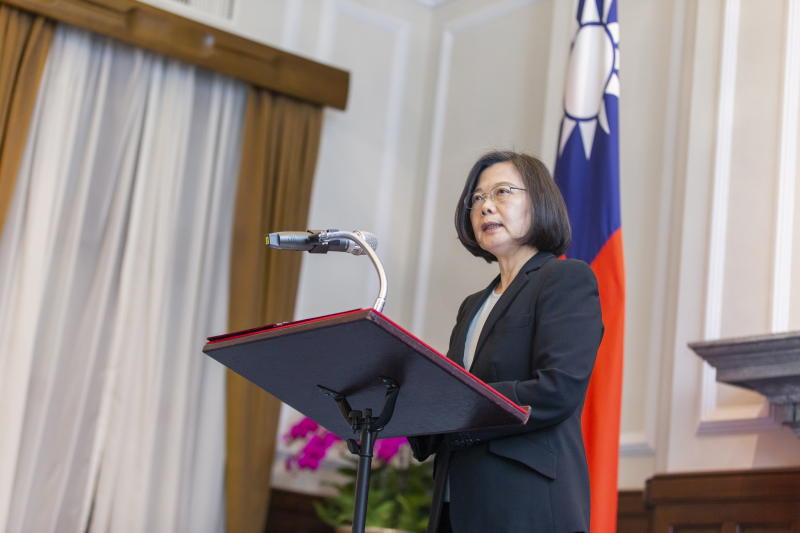Taiwan seeks trade agreement with US, also role in Indo-Pacific strategy: President Tsai Ing-wen
Sign up now: Get insights on Asia's fast-moving developments

Taiwanese President Tsai Ing-wen speaking at a ceremony for promoting military officers in Taipei, on April 1, 2019.
PHOTO: EPA-EFE
SINGAPORE - Taiwan is seeking closer economic relations with the United States through a bilateral trade agreement as it looks to reduce its economic reliance on its largest trading partner China, Taiwanese President Tsai Ing-wen has said.
The self-governing island also considers itself a full partner of the US' free and open Indo-Pacific strategy (FOIP), Ms Tsai said at a forum in Washington, DC, via videoconference from Taipei on Tuesday (April 9). The conference was to mark the 40th anniversary of the Taiwan Relations Act (TRA) enacted by the US Congress on April 10, 1979.
"Taiwan, the United States and other countries pursuing a similar policy really share the same core objectives in the region. That is to promote economic linkages, prosperity and enhance our sense of shared security, while staying true to our values and interests," she said of Taiwan's participation in the FOIP. The FOIP is seen by some in China as a strategy to constrain its rise.
Ms Tsai's remarks come at a time when ties between Taiwan and the US have strengthened as Sino-US relations have deteriorated and as China has stepped up pressure diplomatically and economically on the island that it considers a breakaway province.
China has broken off official contact with Taiwan's government after Ms Tsai, who came to power in 2016, refused to acknowledge the one-China principle. It has also squeezed Taiwan's international space and reduced the number of Chinese tourists going to the island, among other things.
The US, on the other hand, last year enacted the National Defence Authorisation Act that calls for military ships to make port calls in Taiwan and the Taiwan Travel Act that encourages senior-level civilian US officials to visit Taiwan, overturning strict bans on this.
The Asia Reassurance Initiative Act signed last year to promote an Indo-Pacific region diplomatic strategy lists Taiwan among the US' most important security partners in Asia and calls for regular arms sales to Taiwan.
The legally binding TRA, enacted in 1979 as the US severed formal ties with Taiwan to establish diplomatic relations with China, mandates that Taiwan be treated like any foreign country, that it be sold arms of a defensive nature and that the US maintain military capacity to respond to threats to the island's security.
Ms Tsai noted on Tuesday that Taiwan's "democratic way of life is under unprecedented challenge".
"Using economic incentives, control over sources of information and political subversion, China's objective is to divide our society, erode trust in public institutions and make people question our traditional alliances," she said.
She made an appeal to the US, saying: "I hope that the United States can make clear, at a very senior level, that it considers the security of Taiwan vital to the defence of democracy, both here and around the world. And similarly that it considers any threat to degrade Taiwan's freedom, democracy and our way of life of critical concern to the United States."
Commenting on the TRA, Dr Lin Chong-Pin, Taiwan's former deputy defence minister and former vice-chairman of the island's Mainland Affairs Council, said it is a brilliant arrangement under the circumstances then and now that allows Washington to maintain its relations with Taiwan.
He added, however, that it has its limitations and that it serves the best interests of the US. These are, on the one hand, for Taipei not to provoke Beijing to the point of conflict leading to bloodshed, including that of US soldiers. On the other hand, it is in the interest of the US to see Taiwan continue to challenge the undemocratic regime in Beijing through its democracy and freedom.
Dr Lin said Ms Tsai is taking advantage of the strong US support now to press for things such as a bilateral trade agreement. However, she like others is also watching very carefully for when Washington would withdraw its strong support for Taiwan, he added.
Peking University's Professor Jia Qingguo thought the stronger US-Taiwan ties now had to do with the growing gap in strength between the mainland and Taiwan, prompting the US to take action to boost its confidence. Another reason is that problems have cropped up in the Sino-US relationship and the US is using Taiwan to exert pressure on China, he added.


